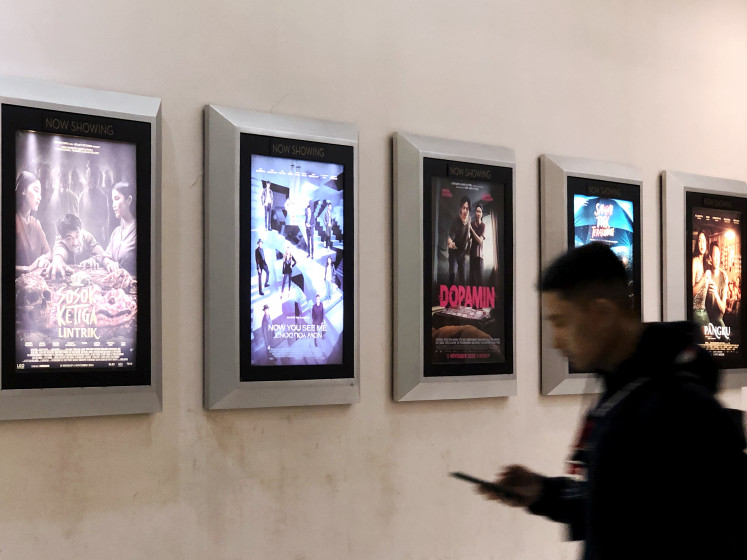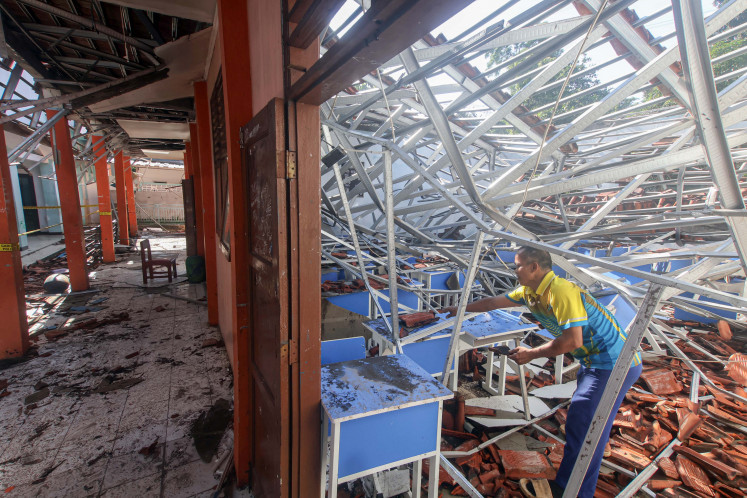Popular Reads
Top Results
Can't find what you're looking for?
View all search resultsPopular Reads
Top Results
Can't find what you're looking for?
View all search resultsTen-minute coronavirus test for $1 could be game changer
Ndodo had to collect samples from a hospital an hour away in Nigeria’s capital, Abuja, then wait for six hours to get the results in what’s one of only five laboratories able to test for the virus in Nigeria, Africa’s most populous nation, with about 200 million people.
Change text size
Gift Premium Articles
to Anyone
A
lready exhausted from testing for monkeypox and Lassa fever, Nigerian molecular bio-engineer Nnaemeka Ndodo had to work well past midnight earlier this month to find out if six Chinese construction workers were infected with the coronavirus.
Ndodo had to collect samples from a hospital an hour away in Nigeria’s capital, Abuja, then wait for six hours to get the results in what’s one of only five laboratories able to test for the virus in Nigeria, Africa’s most populous nation, with about 200 million people.
In about three months’ time, UK-based Mologic Ltd., in collaboration with Senegalese research foundation Institut Pasteur de Dakar, could shorten that wait to 10 minutes with a test that will help a continent with the world’s most fragile health care system cope with the pandemic.
With few resources and staff, authorities are racing to contain the spread of the disease in Africa, which accounts for 1% of global health expenditure but carries 23% of the disease burden, including hundreds of thousands of deaths each year from malaria, HIV/Aids and tuberculosis.
Thirty-six of 54 countries on the continent have the capacity to test for the coronavirus, but a spike in cases could overwhelm laboratories. Ethiopian Prime Minister Abiy Ahmed said Sunday he struck a partnership with Chinese billionaire Jack Ma to distribute between 10,000 and 20,000 test kits and 100,000 masks per African country, as well as newly developed guidebooks for treatment.
Separately, the Ethiopia-based Africa Centers for Disease Control and Prevention expects to distribute 200,000 tests across the continent next week, mostly from Berlin-based TIB Molbiol GmbH, according to the group’s head of laboratory, Yenew Kebede. It’s also sending more than 100 experts across Africa.
“There is no shortage of lab tests in Africa, but what we want is the faster, cheaper test to quickly confirm if there is an outbreak and contain it before it gets bigger,” said Rosanna Peeling, chair of diagnostics research at the London School of Hygiene and Tropical Medicine.
“Africa still has that luxury, unlike Europe and North America,” she said.
That’s where Mologic comes in. Using technology from home pregnancy and malaria tests, its saliva and finger-prick kit could be ready for sale from June for less than $1 apiece. In Africa, they will be manufactured in Senegal by diaTropix, a newly built diagnostics manufacturing facility run by the director of the Pasteur Institute, Amadou Alpha Sall, who has led training around the continent for coronavirus testing.
“We are ensuring that these tests are made accessible at the cost of manufacture,” said Joe Fitchett, medical director of Mologic, which received a $1.2 million grant from the U.K. government to develop the test.
The current COVID-19 tests, known as PCR tests, detect the genetic material of the pathogen in a laboratory process that can take several hours and cost over $400 in some private facilities.
Since the mysterious illness emerged in China late last year more than 150,000 people have been infected around the world, shutting swathes of the global economy as countries lock down cities and ban travel. The US, with ample resources and medical technology, has come under fire for slow testing amid a surge in cases.
Although the spread of the virus has been relatively slow in Africa, the number of patients climbed last week in Egypt, Senegal and South Africa, bringing the total caseload to more than 300 in at least 20 countries, with most patients having recently traveled to Europe.
Mologic and the Institut Pasteur have joint capacity to produce 8 million tests a year and plan to sell them directly to African governments as well as the Global Alliance for Vaccines and Immunization and the WHO, Fitchett said. Mologic is seeking to acquire a manufacturing facility to produce an additional 20 million tests annually, initially in the UK and later in Africa.
Training is being ramped up too. Fifteen African laboratories received guidelines last month from the Senegalese institute to diagnose the virus, while additional training was held in South Africa for another 12 African countries.
In Nigeria, health officials are trying to speed up diagnosis by training staff at other public laboratories, said Chikwe Ihekweazu, the head of Nigeria’s Centre for Disease Control. The country is in talks with partners and donors to acquire more kits after confirming two cases of the virus.
“A quick test could be a game changer for us,” said Ihekweazu, adding that symptoms similar to malaria, which is widespread in Africa, could complicate diagnosis early on.
Before 2017, Nigeria had only one laboratory to test for influenza, inside a refurbished, 48-foot container in the capital. Since then, the lab has been moved to a three-story building known as the National Reference Laboratory.
“We are working non-stop,” said molecular bio-engineer Ndodo as he inspected new machinery inside the modern reference laboratory. “We need to keep working. We will get over this.”










